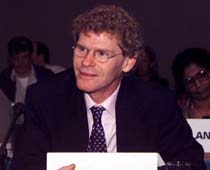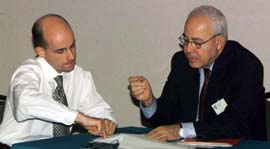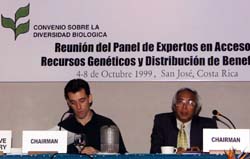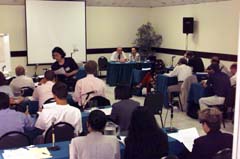|
|
|
Panel Co-Chair Medaglia (Costa Rica) called
upon the working group Chairs to deliver progress reports.
 A.H.
Zakri (Malaysia) reported that the working group on
ABS for scientific and commercial A.H.
Zakri (Malaysia) reported that the working group on
ABS for scientific and commercial
purposes held discussions on MAT and benefit-sharing that
resulted in draft
conclusions on lessons learned, information needs and capacity-building
needs.
|
 Lev Kalakoutskii (Russian Federation, pictured on the right)
and Kerry ten Kate (UK) presented the outcomes of the group
on the review of legislative, administrative and policy measures,
regulatory procedures and incentive measures. They reported
that the group discussed key elements of PIC by considering
the meanings of "prior," "informed" and "consent," and highlighted
draft recommendations, which include the need for Parties to
address ABS measures in their national strategies, establish
national focal points and adopt interim measures such as voluntary
guidelines.
Lev Kalakoutskii (Russian Federation, pictured on the right)
and Kerry ten Kate (UK) presented the outcomes of the group
on the review of legislative, administrative and policy measures,
regulatory procedures and incentive measures. They reported
that the group discussed key elements of PIC by considering
the meanings of "prior," "informed" and "consent," and highlighted
draft recommendations, which include the need for Parties to
address ABS measures in their national strategies, establish
national focal points and adopt interim measures such as voluntary
guidelines. |
 |
 Following Kalakoutskii and ten Kate's report, ARGENTINA
Following Kalakoutskii and ten Kate's report, ARGENTINA
made observations on national focal points
|
 |
NORWAY was among the participants
to express concern that too little time was alloted for the
discussion of the reports of the Working Groups. |
| Hamdallah Zedan,
Executive Secertary of the CBD, discusses the agenda with Panel
Co-Chair Martin Girsberger (Switzerland) |
 |
 |
The Working Group on Access And
Benefit-Sharing For Scientific And Commercial Purposes discussed
lessons learned from benefit-sharing and the disclosure of country
of origin. It also reviewed and amended summaries of the previous
day's discussions on MAT and benefit-sharing. Pictured here
is WG Chair A.H. Zakri (right) and Sam Johnston, CBD Secretariat. |
| The Working Group
on Review Of Legislation, Administration And Policy Measures,
Regulatory Procedures And Incentive Measures focused on international
measures to support PIC, access legislation, IPR and incentive
measures. The group also developed draft text on access legislation
for the final report of the Panel. |
 |
 |
Despite initial opposition, a
working group was established to consider IPR. Some opposing
experts felt that IPR issues should only be addressed by the
WTO and TRIPs agreement, while others feared opening a "can
of worms." Those in favor of the group hoped that holding a
discussion among experts with varying backgrounds and views
would provide a unique opportunity to forward the debate and
to bring the impact of IPR on biodiversity conservation to the
attention of the WTO. (Note the ENB's Mark Schulman in the
foreground) |